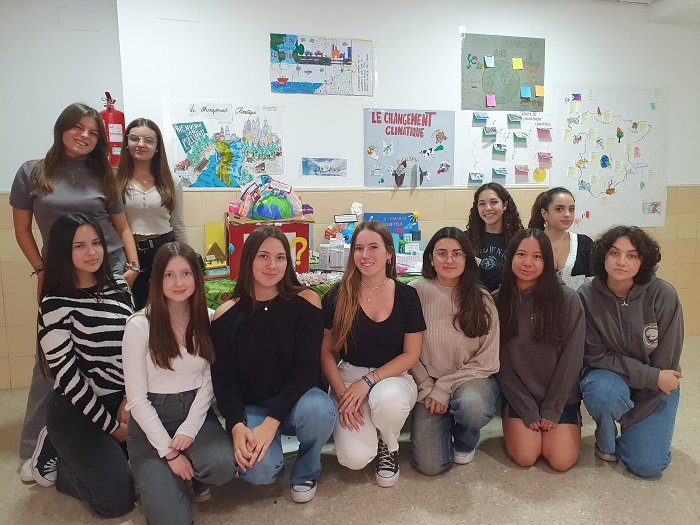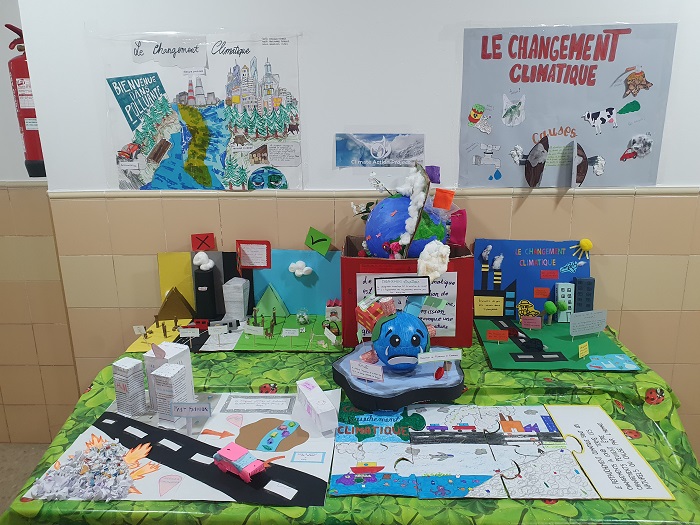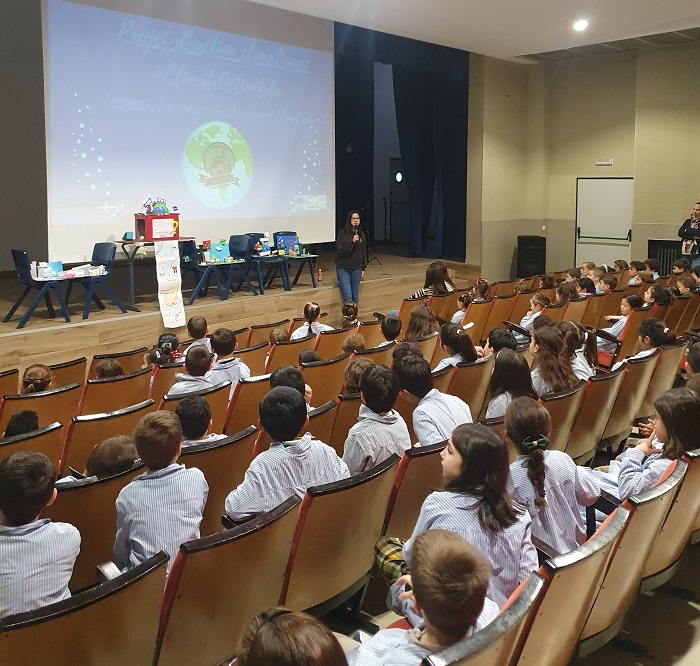30 Nov 2024

Friend of the Sea
Project of the World Sustainability Organization
Climate literacy is crucial in today's world, and integrating it into school curricula can have profound benefits for both students and society as a whole.

In a world where the effects of climate change are becoming increasingly evident, it's imperative that the younger generation is equipped with the knowledge and tools to tackle this global crisis. Recognizing this urgency, a group of 17-year-old students has taken it upon themselves to educate their peers, particularly the younger ones, about the importance of understanding and addressing climate change.
These students, driven by a passion for environmental sustainability and a desire to make a difference, have embarked on a journey of enlightenment and activism through their participation in the "Climate Action Edu" project, spearheaded by Jennifer Williams (@JenWilliamsEdu) and Koen Timmers (@koentimmers) under the organization "Take Action Edu" (@TakeActionEdu) and (@ClimateActionED). Through this project, they have not only deepened their own understanding of climate change but have also become advocates for change within their own communities.
One of the pivotal moments in their journey was the decision to share their knowledge with younger peers, specifically 6 and 7-year-olds. Understanding the significance of early education in shaping attitudes and behaviors, these students recognized the importance of instilling awareness about climate change from a young age. They believe that by starting conversations early, they can foster a generation that is not only environmentally conscious but also proactive in addressing climate-related issues.
During their interactions with the younger children, these students emphasized the causes and effects of climate change in a manner that was both engaging and understandable. They illustrated how climate warming directly impacts daily life and health, drawing connections between extreme weather events, air pollution, and their consequences on human well-being. By making these concepts relatable to the experiences of the younger children, they effectively conveyed the urgency of the climate crisis and the need for collective action.

In their second meeting, the focus shifted towards empowering the younger generation to take action in their own lives. Recognizing that even small actions can have a significant impact, these students encouraged their peers to consider how they could contribute to environmental conservation and protection. They emphasized the importance of preserving wildlife, biodiversity, and nature in general, highlighting the interconnectedness of all living beings and ecosystems.
Through interactive activities and discussions, they brainstormed practical steps that the younger children could take to mitigate their carbon footprint and promote sustainability in their daily lives. From recycling and reducing waste to advocating for green spaces in their communities, the students inspired their peers to become stewards of the environment and champions of change.
During their interactions with the younger children, these students found creative ways to make learning about climate change both informative and entertaining. In one particularly amusing moment, they delved into the topic of methane emissions, drawing attention to the surprising fact that even animals contribute to greenhouse gas production through their flatulence.
With giggles and laughter echoing through the classroom, the students sparked curiosity about the connection between animal farts and climate change. Using playful anecdotes and visuals, they explained how methane, a potent greenhouse gas, is released into the atmosphere when animals, such as cows and sheep, digest their food.
"Did you know that cows have a superpower? They can fly! Well, not exactly, but their farts contain methane, which can float up into the air and trap heat," one student exclaimed, prompting a chorus of astonished gasps from their young audience.
Through this lighthearted yet informative approach, the students effectively conveyed the message that even seemingly trivial actions, such as a cow's burp or a sheep's bleat, can have significant environmental consequences. By making the connection between animal behavior and climate change, they encouraged their peers to think critically about the impact of human activities on the planet.
The laughter-filled lesson served as a reminder that while climate change is a serious issue, learning about it doesn't have to be dull or daunting. By infusing humor and creativity into their educational efforts, these students fostered a sense of joy and curiosity that will hopefully inspire their younger peers to become lifelong champions of environmental stewardship.
In this way, even the most unexpected subjects, such as animal farts, can serve as valuable teaching moments in the fight against climate change. As the students continue their journey of climate education, they are proving that laughter truly is the best medicine, even when it comes to addressing the world's most pressing challenges.
The initiative undertaken by these 17-year-old students serves as a powerful reminder of the transformative potential of youth activism in combating climate change. By leveraging their knowledge, passion, and creativity, they are not only raising awareness but also inspiring action at the grassroots level. Their efforts exemplify the importance of education and empowerment in nurturing a generation of responsible global citizens who are committed to safeguarding the planet for future generations.
In a world where the stakes have never been higher, it is heartening to see young individuals stepping up to confront the challenges of climate change head-on. As they continue on their journey as agents of change, these students offer hope for a more sustainable and resilient future for all.

Climate literacy is crucial in today's world, and integrating it into school curricula can have profound benefits for both students and society as a whole. Here's how:
Understanding the Science: Climate literacy provides students with a solid foundation in the science behind climate change, including the causes, mechanisms, and impacts. By understanding the scientific principles at play, students are better equipped to critically evaluate information and make informed decisions about environmental issues.
Empowering Youth: Education empowers students to become active agents of change in their communities. By arming them with knowledge about climate change, students are empowered to take meaningful action to mitigate its effects and advocate for sustainable solutions.
Fostering Environmental Stewardship: Climate literacy instills a sense of responsibility for the environment and encourages students to become stewards of the planet. By learning about the interconnectedness of ecosystems and human activities, students develop a deeper appreciation for nature and are inspired to protect it for future generations.
Preparing for the Future: As the effects of climate change become increasingly apparent, it is essential for students to be prepared to address the challenges that lie ahead. Climate literacy equips students with the skills and knowledge necessary to adapt to a changing climate and build resilient communities.
Promoting Interdisciplinary Learning: Climate change is a complex issue that intersects with various fields, including science, geography, economics, and social studies. By incorporating climate literacy into different subject areas, schools can promote interdisciplinary learning and help students understand the interconnected nature of environmental issues.
The growing interest of students in climate literacy reflects their recognition of the urgency of the climate crisis and their desire to be part of the solution. Today's students are passionate about environmental sustainability and are eager to learn more about how they can make a difference. By harnessing this enthusiasm and providing opportunities for meaningful engagement, schools can cultivate a generation of environmentally conscious citizens who are equipped to tackle the challenges of climate change head-on.

Comment
Reply